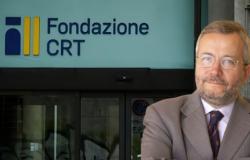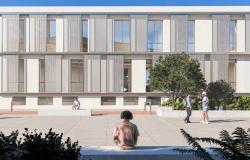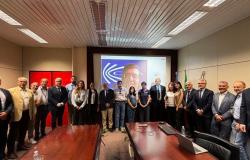THE EAGLE. «It must be understood that a prince cannot observe in his conduct all those things for which men are considered “good”, because often to preserve and save the situation it is necessary not to follow the rules of honesty, charity, humanity and religion». The words of Nicolò Machiavelli in The Prince, the work that made the Florentine writer, philosopher, historian and playwright (1469 – 1527) immortal, come back to life on the stage of the Cantieri dell’Immaginario in a special evening, scheduled for Wednesday 17 July at the Scalinata di San Bernardino dell’Aquila (9pm).
THE SCENE On stage Manuele Morgese, directed by Livio Galassi who experiments, with the language of Machiavelli, a theatrical form linked to sound, the search for new expressive forms and innovation. A project that sees the extraordinary participation of one of the most beautiful voices on the Italian singing scene, Antonella Ruggiero. A choice, this, which marks a sophisticated research and plurality of styles to embellish this Teatrozeta production. Accompanying Morgese and Ruggiero are two notable musicians, Renzo Ruggieri on the accordion and Paolo Di Sabatino on the piano.
THE TREATY Whatever way one interprets his intentions, Tim Parks recalls, the Prince never leaves anyone indifferent. We cannot remain impassive in the face of the disturbing idea that politics cannot be guided by those ethical codes that most of us observe in our daily lives. And whatever our reaction to this idea, once we close the book it will be very difficult to continue thinking about our contemporary leaders in the same way as before.
A CURRENT WORK But what is Machiavelli’s Prince today? What is so captivating in a literary formula so distant from today’s life like that of the “treatise”? Why should it then stimulate a theatrical and, perhaps, spectacular appetite? What does the power exercised today by the leaders of world powers tell our daily life or daily living? But above all: is it possible to make 2023, in the midst of an apparently “non-global” conflict, a starting point for profound human reflection, not just political? Why choose the Prince? «Because Machiavelli goes beyond his historical moment», observes Morgese, «speaking to us first of all about power as an impulse, as old as man, without an era. Because when we talk about power, in a program even if of an artistic nature designed for a three-year period of work, we cannot avoid thinking of that “end that justifies the means” banner of Machiavelli and of the “Machiavellian” derivation that qualifies a ‘action inspired by principles that exalt cunning and the lack of any scruple in political and social relationships.’ The Prince is a caustic work that is extremely timely, an authentic manual of what today is called realpolitik. «But from Machiavelli’s pen, on stage we like to think about the restitution of that suggestion of thoughts that becomes action», adds the director, «the voice of the actor who chews the word transforming it into flesh and then into stones, boulders, plants or animals.” Not a theatrical show in the strict sense but, as the L’Aquila company has been doing for years «through the search for new languages, we will talk about a theatrical evocation that blends words and sounds, singing and acting, music and silence, refined and evoked performances, which as Kurt Weill-style Brechtian sketches depict that damned human being, like the Prince, in search of power.” The idea of this exhibition aims to restore intact «the unmistakable flavor of that Renaissance language so different from our Italian and yet so profoundly ours», underlines Morgese, «all to be enjoyed, while he outlines with clear brushstrokes the portraits of dozens of past princes, from Ludovico il Moro to Pope Borgia, from Duke Valentino to Emperor Septimius Severus without forgetting Mohammed II of Turkey. The presence of a female voice tears apart the dense and dark canvas of philosophical arguments and technicalities of content, which accompanies the lucubrations narrated and recited by the actor, the broken rhythm, dystonias – harmonies, wants to give the public a mirror in which to look at themselves and see, perhaps, a reflection of the other, similar to Machiavelli’s Prince.”
THE FACES OF POWER The Prince is a new act of the Faces of Power cycle. «Through a path of research and experimentation shared by the company’s artists with scientific consultants who have collaborated with Teatrozeta for years», explains Morgese, «the project on Power has had multiple declinations translated into theatrical and performative shows: The power of the mafia, from 70s to the present day dyed by the blood of the massacres; the homage to Falcone and Borsellino and to the many dead killed by the mafia in Statelessness, or the power of the mafia that is saw the light in April 2022, written, directed and performed by me”. This first study on power was followed in 2023 by the show Devolution written and directed by Rolando Macrini, established director of La Mama Theater in New York and which follows the experimental and performative path, La Mama style, precisely. «Therefore», concludes Morgese, «The Prince by Nicolò Machiavelli represents the third chapter of the project I started. For me it represents a prestigious collaboration also thanks to the musical choices and the extraordinary presence of Antonella Ruggiero.” After all, Morgese loves to surround himself with quality musicians, especially in the field of jazz, as in the case of Fabrizio Bosso.
For Latest Updates Follow us on Google News






